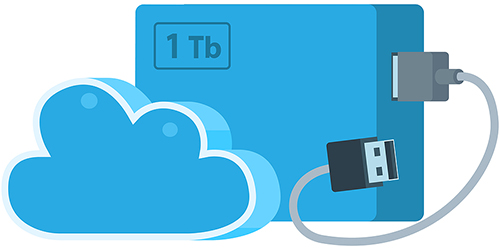
In today’s digital age, backing up your important data has become more important than ever before. With the increasing amount of information stored in our computers, the risk of losing it all due to a technical failure or a malware attack is also increasing. While there are many options available for backing up data, two of the most popular options are using an external hard drive and a cloud backup.
An external hard drive is a physical device that connects to your computer via a USB or Thunderbolt cable and provides extra storage space for your files. A cloud backup, on the other hand, is a remote backup service that stores your data on a server located in a data center. Both these options have their own advantages and disadvantages, and which one to choose depends on your personal needs and preferences.
Let’s take a closer look at the advantages and disadvantages of each option.
External Hard Drive:
Advantages:
- Affordability: External hard drives are generally more affordable than cloud backup services. They are a one-time investment that can last for years, whereas a cloud backup service requires a monthly or yearly subscription fee.
- Control over data: With an external hard drive, you have complete control over your data. You can decide what to back up, how often to back up, and where to store the backup. This can give you peace of mind knowing that your data is safe and secure.
- No internet required: External hard drives do not require an internet connection to function. This means that you can back up your data even if you are in a remote location without access to the internet.
Disadvantages:
- Vulnerability to physical damage: External hard drives are vulnerable to physical damage. They can be dropped, damaged by water, or destroyed by fire, which can result in the loss of your data.
- Limited storage space: External hard drives come in different sizes, but their storage space is limited. If you have a large amount of data to back up, you may need to purchase multiple external hard drives, which can become expensive.
- Limited accessibility: External hard drives can only be accessed from the computer they are connected to. If you need to access your data from a different computer, you will need to physically connect the external hard drive to that computer.
Cloud Backup:
Advantages:
- Automatic backups: Cloud backup services offer automatic backups, which means that your data is backed up on a regular basis without any manual intervention required.
- Accessibility: Cloud backup services allow you to access your data from any computer or mobile device with an internet connection. This makes it convenient for people who need to work on the go.
- Security: Cloud backup services use encryption to protect your data from unauthorized access. This means that your data is safe and secure even if someone gains access to the server where it is stored.
Disadvantages:
- Monthly fees: Cloud backup services require a monthly or yearly subscription fee, which can become expensive over time.
- Dependence on internet connection: Cloud backup services require an internet connection to function. If you do not have access to the internet, you will not be able to back up your data or access your backups.
- Limited control over data: With cloud backup services, you have limited control over your data. You cannot decide where to store your backup or how often to back up your data. This can be a concern for people who are particular about the security of their data.
Conclusion:
Both external hard drives and cloud backup services have their own advantages and disadvantages. Which one to choose depends on your personal needs and preferences. If you have a limited budget, and you need complete control over your data, an external hard drive may be the better option. However, if you need automatic backups, accessibility, and security, a cloud backup service may be the right choice.



